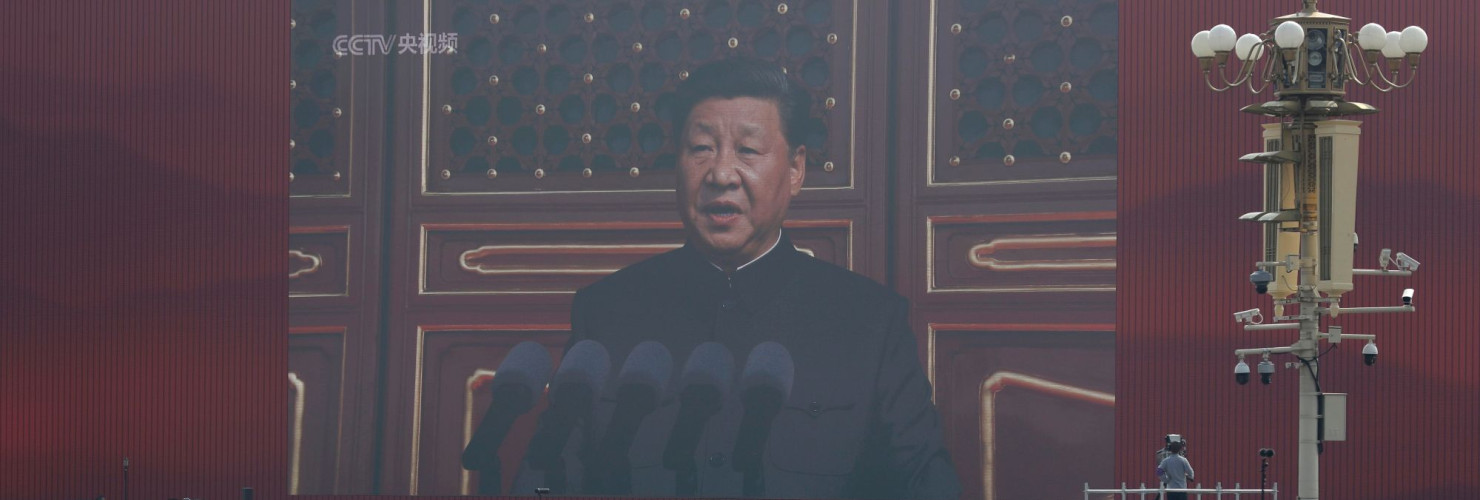

Rewriting world history to redefine the global order: Xi’s claim to China’s moral right to lead
Beijing is reshaping World War II narratives in a bid to challenge US dominance. But Claus Soong argues that its call for “genuine multilateralism” is not all that it appears to be.
Xi Jinping used China’s Victory Day marking the 80th anniversary of the end of World War II and its 76th National Day celebrating the founding of the People’s Republic of China to advance a version of history that aims to legitimize Beijing’s opposition to US dominance and its push for a new international order. Calling for “genuine multilateralism” at the National Day reception on 30 September, Xi echoed his 3 September remembrance of World War II as “the joint struggle of the Chinese people together with anti-fascist allies and peoples across the world.”
In linking China’s victory over Japan in 1945 with the authority of today’s Chinese Communist Party (CCP), Xi glossed over the fact that Chiang Kai-shek’s Nationalists were in power until 1949, retroactively inserting the CCP into the then Republic of China’s wartime successes. In doing so, he transformed China’s World War II remembrance into an assertion of the CCP’s right to lead in reshaping the international order Xi now seeks to redefine. “The Chinese people firmly stand on the right side of history,” he declared in Beijing during his Victory Day speech.
The reinterpretation of China’s role in WWII also extends to supporting Beijing’s claim over the sovereignty of Taiwan. Celebrating the “Restoration of Taiwan” for the first time in 80 years this year, Beijing highlights the recovery of Taiwan’s sovereignty from Japan as one of China’s major achievements after WWII — despite the fact that Japan surrendered to the Nationalist government in Nanking in 1945, when Beijing was still called Peking and the People’s Republic of China did not yet exist.
Beijing’s idea of multilateralism: an order led by great powers
A look back to these same commemorations a decade ago shows how far Beijing’s idea of multilateralism has shifted – towards an order led by great powers, not the West. For Beijing, the West—whether with the US at its center or not—has become increasingly optional, if not an obstacle, to China’s ambition to reform, or even reshape, the international order. In 2015, representatives from Western countries, including former heads of government from Germany and the UK, attended Victory Day. In 2025, the West was absent as Xi hosted two authoritarian partners. Despite Western sanctions, Russian President Vladimir Putin and North Korean leader Kim Jong Un were warmly received in Beijing, in part to show that China still has friends.
The tones of Xi’s speeches in 2015 and 2025 also diverged. Ten years ago, the narrative was more inclusive, explicitly acknowledging the “broad support from the international community” that helped China in its long resistance to Japanese occupation. “The Chinese people will forever remember the contributions made by peoples of all countries to China’s victory in that war,” Xi said then. But in 2025 Xi hailed China as a leading force in the war: “The Chinese people made significant contributions to saving human civilization and safeguarding world peace.”
Xi frames China as a rightful arbiter of global governance
Crucially, Beijing has begun to extend its reinterpretation of China’s Word War II legacy beyond historical narrative into a campaign to reshape international institutions and norms, particularly the United Nations (UN). By positioning the CCP as the moral heir to the anti-fascist struggle, Xi frames China as a rightful arbiter of global governance. As the world commemorates the 80th anniversary of the founding of the UN in 1945, “upholding the authority of the United Nations” has become a recurring theme in Xi Jinping’s speeches and China’s diplomatic narratives.
This emphasis accompanies Beijing’s calls for a multipolar world and opposition to unilateralism, articulated through the promotion of its global initiatives. Ranging from the Belt and Road Initiative (BRI) for infrastructure and development, to the Asian Infrastructure Investment Bank (AIIB) and the Global Development Initiative (GDI) for financing and governance, as well as frameworks for security cooperation, they illustrate how China envisions reforming international relations to succeed the existing US-led order that has failed to deliver fairness or stability.
But China’s Global Security Initiative (GSI) and Beijing’s growing alignment with Russia demonstrate how Beijing is actually seeking to reinterpret the global order to serve its geopolitical ambitions under the banner of multipolarity. Xi has asserted that “it is for the people of Asia to run the affairs of Asia” and to “solve the root cause” of conflicts, while Putin has called for “a new security system in Eurasia.” In doing so, both leaders are laying claim to traditional spheres of influence that have caused so much instability in the past.
Xi and Putin are glossing over the complex histories of empire
Both Xi and Putin are glossing over the complex histories of empire, subjugation, and the fears of Communist expansion during the Cold War that turned the US into a welcome presence in many parts of Asia and led to the founding and steady expansion of NATO in Europe. Whether it is Putin’s claims over Ukraine or Xi’s claims over Taiwan and the South China Sea, both leaders pose challenges to the existing security architectures of Europe and the Asia-Pacific region – key components of the post-World War II order – ultimately targeting the US presence, which remains the backbone for regional stability by protecting smaller countries from aggression.
Xi’s call for “genuine multilateralism” primarily serves to create more space for China to lead. By promoting revised historical narratives, China seeks to gain legitimacy to construct a counter-narrative that challenges the US and the liberal order. Its alignment with Russia is not only driven by US–China competition but also by historical lessons from the Cold War and the dissolution of the Soviet Union. In shaping both memory and policy, China is demonstrating a clear understanding of what George Orwell said in 1984: “Who controls the past controls the future.”
